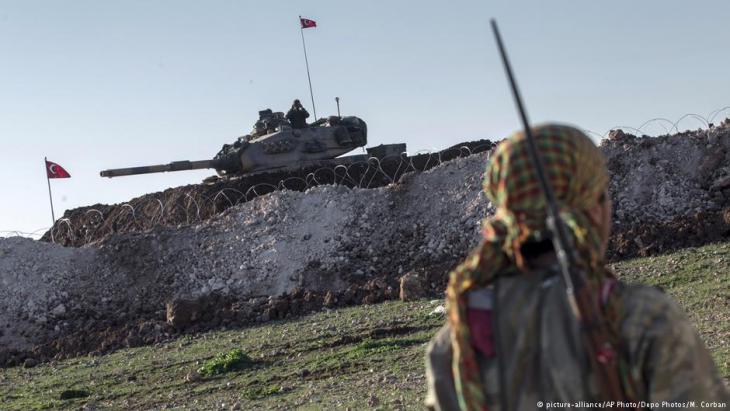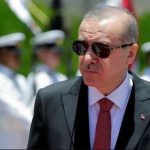The last thing the conflict in Syria needed was more external intrusion and the opening of another front. Turkey′s Afrin offensive has provided both. Once again, the Western powers and Russia have managed to foster a dangerous escalation.
Turkey′s military incursion into the Kurdish-controlled northern Syrian canton of Afrin – launched on 20 January under the slighting codename Operation Olive Branch – ought to have taken no-one by surprise. While the bungled announcement of United States plans to incorporate the Kurdish-led Syrian Democratic Forces (SDF) in a 30,000 Syrian strong border forceappears to be the temporary justification, the attack was long in the making: the Turkish government had been openly threatening military action in Afrin for more than a year.
The Turkish army (equipped with German Leopard 2A tanks) has advanced into Syria from five incursion points in the Turkish provinces of Kilis and Hatay under cover provided by the Turkish Air Force and artillery. While the reported number of so-called Free Syrian Army (FSA) fighters accompanying the Turkish army has been exaggerated, more than 3000 Syrian rebel militiamen are with the ranks as front-line soldiers.
These militias are essentially Turkish proxies used entirely in the service of Turkey′s goals. The fighters themselves are motivated primarily by the desire for revenge on the Kurdish Democratic Union Party (PYD) and its military wing the People′s Protection Units (YPG) whom they despise.

The age-old agenda: ″in attacking Afrin Turkey is not merely trying to establish itself as a permanent fixture in northern Syria, it is attempting to destroy the possibility of any Kurdish power centre emerging – even at the cost of strengthening the Assad regime,″ writes Stevenson
Thus far the PYD/YPG – which Turkey correctly claims is merely the Syrian arm of the Kurdistan Workers′ Party (PKK) – has mostly avoided meeting the Turkish force in the open and has instead chosen tactical retreat and ambush over engagement. Nonetheless, as the Turkish force advances and with the positions of the international powers muddled, the risk of greater conflict and bloodshed is considerable.
What is Turkey up to?
Turkey′s interests are clear. The incursion into Afrin canton allows Turkey to strike at valuable PKK strongholds close to the Turkish border, damage the strength of the Kurdish polity in northern Syria and thereby attempt to destroy the possibility of a Syrian Kurdish quasi-state emerging on its souther border in the aftermath of the war.
All of this plays well domestically for the Turkish government. Where Turkey′s past incursion into Syria (Operation Euphrates Shield around Jarablus in August 2016) was presented as an anti-IS campaign, the incursion in Afrin is seen by nationalist Turks as open war with the PKK, which the Turkish state has been fighting in its brutal campaign within Turkey′s Kurdish province for decades. For added benefit, the Syrian Kurdish forces are painted by the Turkish government as proxies of the reviled United States.
Turkey′s ultimate objectives are, however, ambiguous. According to Turkish government officials, the goal is the establishment of a 30 kilometre buffer zone along its southern border as a bulwark against ″terrorism″ (no such buffer was sought when either al-Qaida or IS were embedded on the same border).
″The military operation in Afrin aims to liberate the area by eliminating the PKK-YPG-linked administration, which has been repressing the local population,″ one Turkish official said. This is bluster, whatever Turkey intends for Afrin, democracy has little to do with it.

The most densely populated Kurdish region
Entering Afrin city itself, which is majority Kurdish, would be difficult for the Turkish forces. The PYD/YPG enjoy considerable support within Afrin, which is the most densely populated Kurdish region of Syria.
Turkey may look instead to seize the handful of primarily Arab towns around Afrin, including Tel Rifaat and then beseige Afrin in an attempt to force the PYD/YPG into a negotiated withdrawal. In addition, Turkey may try to open a small corridor east to connect the current incursion with the Euphrates Shield operation around Jarablus.
Counter-intuitively, Turkey may even look to force a deal with Russia and the Syrian government in which the PYD/YPG cede control of the city to the Assad regime. Given Turkey′s open intention to make a second, similar advance towards the city of Manbij, a quick win in Afrin along those lines would still be counted a strategic victory.
For their part the Syrian Kurds appear to have been hoping that the United States or France would provide protection against a Turkish attack by raising the matter at the United Nations Security Council; despite past rhetoric about supporting the Syrian Kurds neither power has proved willing to do so.
Power games
Faced with the wilting of its Western allies, the Syrian Kurds have fallen back on an ineffectual call for international solidarity with its nation building project, which it presents as a radical form of decentralised democracy. ″We are calling on all democratic forces and peaceful people to show strong solidarity with our people against brutal and inhuman attacks on Afrin,″ the PYD wrote in a public statement.
In truth the Syrian Kurds have long been playing a double game in international diplomacy. While working directly with the United States in its north-eastern Jazira canton around Hasakah, they have simultaneously attempted to play the U.S. and Russia off against one another in search of international support in Afrin canton.
Russia and the Syrian regime, provoked like Turkey by the announcement of U.S. plans to employ the Syrian Kurdish military as a border guard, have now also withdrawn any tacit protections intimated to the Syrian Kurds in the past, opening the field for the Turkish incursion.
As a result, Afrin is fast becoming a quagmire for Syria′s Kurds. A withdrawal from Afrin in the face of the uncertainties of U.S. policy would be a humiliation but may ultimately secure an autonomous federal region in north-eastern Syria. Refusal to cede Afrin would mean fighting on against the Turkish force alone and potentially losing U.S. backing in Syria′s north-east.
In attacking Afrin Turkey is not merely trying to establish itself as a permanent fixture in northern Syria, it is attempting to destroy the possibility of any Kurdish power centre emerging – even at the cost of strengthening the Assad regime. That a sizeable portion of the Syrian opposition supports the attack is an indictment of both its degraded state and the times.
By Tom Stevenson
Source: Qantara



